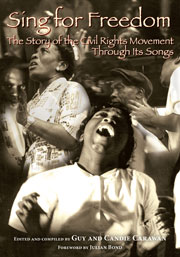 In a nicely observed piece about the life and work of Guy Carawan, Peter Dreier of The Huffington Post shares that Carawan will be honored at a “Singing for Justice” celebration on October 23 at the home of Jan Goodman and Jerry Manpearl in Santa Monica, California; tickets may be purchased for $35.
In a nicely observed piece about the life and work of Guy Carawan, Peter Dreier of The Huffington Post shares that Carawan will be honored at a “Singing for Justice” celebration on October 23 at the home of Jan Goodman and Jerry Manpearl in Santa Monica, California; tickets may be purchased for $35.
Carawan is the legendary singer, folklorist, and activist whose arrangement of “We Shall Overcome” became the anthem of the Civil Rights Movement. Working from the Highlander Research and Education Center in Tennessee, a training center for grassroots activists where he was music director for many years, Carawan became an evangelist for the music that was his life.
Carawan understood its power to affect hearts and to affect change and the role it played in social struggle. At sit-ins and other demonstrations, he sang the freedom songs and encouraged others to sing as well, says Dreier, and “believing that singing and music could be a unifying force, [Carawan] also taught the SNCC activists the Southern gospel and religious songs, changing a word here and there to adapt it to their cause.”
Documenting that unique connection between music and the Movement, Guy and Candie collected these songs and had them published in book form. Originally two volumes, We Shall Overcome and Freedom Is a Constant Struggle were reissued as Sing For Freedom: The Story of the Civil Rights Movement Through Its Songs by NewSouth Books in 2007, on the 75th anniversary of the Highlander Center. The book is a collection of freedom songs and many important photographic images, which along with copious notes makes possible an enhanced understanding of the Movement through its music.
As the Carawans state in their preface to the NewSouth edition of Sing For Freedom:
There is much history in this book, along with the songs. The stories and photographs remind us of a time when great changes took place in this country. We know from our work at Highlander and from our understanding of history that change happens when people organize and insist on the changes. In the early 1960s, the black South organized. Dr. Bernice Johnson Reagon has reflected on the role that singing played in maintaining a nonviolent movement: The singing of words of hope and defiance helped people maintain control and dignity in the face of great harrassment and danger.
Surely we still need these lessons.
Sing For Freedom is available from NewSouth Books, Amazon.com, or your favorite retail or online bookseller.
